ASK AMY: What Sweeteners Are Okay To Use With PCOS?
For the most up to date word from PCOS Diva on sweeteners for PCOS, check out Best & Worst Sweeteners for PCOS.
Ask Amy: I know you say not to use artificial sweeteners like Splenda, but what can we use to sweeten foods and beverages? – Stephanie, Boston, MA
Amy says: Who among us doesn’t love sweets? The sweet flavor releases serotonin in our brains, the chemical responsible for our sense of well-being and contentment. But when it comes to sweeteners, not all are created equal. There are side effects and health risks from refined sweeteners like white table sugar and high-fructose corn syrup, and from artificial sweeteners like NutraSweet, saccharin and Splenda. Since refined sweeteners have been stripped of vitamins, minerals and fiber, they can spike blood sugar, which can often lead to cravings and mood and energy fluctuations. Instead, using naturally and minimally processed sweeteners can reduce cravings for sugary things.
Here are a some natural sweeteners to substitute in drinks, food and baking. Since they are all typically sweeter than refined sugar, you can use less. You can find them in most supermarkets or natural food stores. I have also included links to Amazon. When replacing sugar with liquid sweeteners in a recipe, reduce the amounts of other liquids. With any sweetener, a little goes a long way. We ultimately should be training our taste buds to appreciate the natural sweetness of fruits and veggies without adding a lot of extra sweeteners to our foods. If you take sweetener in your tea and coffee experiment with weaning yourself little by little.
Raw Honey
What’s not to love about honey, one of the oldest natural sweeteners on the market? Honey will have a different flavor depending on the plant source. Some are very dark and intensely flavored. Wherever possible, choose raw honey, as it is unrefined and contains small amounts of enzymes, minerals and vitamins. The GI of raw honey is 30.
Maple Syrup Maple syrup is the concentrated extract of the sap of maple trees. It adds a rich, deep flavor to foods and drinks. Make sure to look for 100% pure maple syrup, not maple-flavored corn syrup. As with all sweeteners, organic varieties are best. Recently, maple syrup was found to contain substantial quantities of abscisic acid, a phytohormone known to stimulate insulin release through pancreatic cells and to increase sensitivity of fat cells to insulin, which makes it a potent weapon against metabolic syndrome and diabetes. The GI of maple syrup is 54. Read more: http://www.upi.com/Health_News/2010/03/26/Maple-syrup-reduces-cancer-diabetes-risk/UPI-11371269647350/#ixzz1QasIy8NF
Stevia Stevia is a sweetleaf herb, a relative of the sunflower. Amazingly, studies have shown stevia to taste 300 times sweeter than sugar. Stevia is high in chromium and has no effect on blood sugar levels while also aiding the pancreas and supporting digestion. I like to use Navitas Naturals Organic Raw Stevia Powder. I use stevia to sweeten oatmeal, smoothies and beverages. This brand is not as processed as most “white” forms of stevia.
Yakon Syrup Yacon syrup is native to the Andean region of South America. It is glucose-free, and 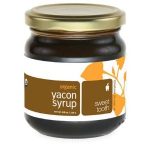 does not increase blood sugar levels. The syrup is derived from the roots of the yacon plant, and according to some studies is a good source of antioxidants. Yacon syrup is often compared to molasses, caramel, or honey in taste, with a deep and rich flavor. It easily substitutes for maple sugar or molasses in recipes, and can be used to sweeten beverages.
does not increase blood sugar levels. The syrup is derived from the roots of the yacon plant, and according to some studies is a good source of antioxidants. Yacon syrup is often compared to molasses, caramel, or honey in taste, with a deep and rich flavor. It easily substitutes for maple sugar or molasses in recipes, and can be used to sweeten beverages.
Coconut Palm Sugar is derived from the coconut palm tree. It is the crystallized nectar of the coconut palm flowers. Palm sugar serves as an ideal sugar substitute for those of us with PCOS who are watching their glucose levels. The glycemic index is low at 35. This organic, evaporated palm sugar has a nutritional content far greater than all other commercially available sweeteners — with high amounts of potassium, magnesium, zinc and iron, as well as vitamin C and many of the B vitamins.
Organic Blackstrap Molasses 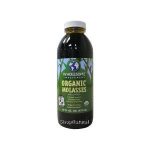 Blackstrap molasses is the dark liquid byproduct of the process of refining sugar cane into table sugar. It is made from the third boiling of the sugar syrup and is therefore the concentrated byproduct left over after the sugar’s sucrose has been crystallized. Unlike table sugar that has been stripped of nutrients, blackstrap molasses is a healthful sweetener that contains significant amounts of a variety of minerals that promote your health. Molasses is also an excellent source of iron, calcium, copper and manganese and a very good source of potassium, and magnesium. The GI of blackstrap molasses is 55.
Blackstrap molasses is the dark liquid byproduct of the process of refining sugar cane into table sugar. It is made from the third boiling of the sugar syrup and is therefore the concentrated byproduct left over after the sugar’s sucrose has been crystallized. Unlike table sugar that has been stripped of nutrients, blackstrap molasses is a healthful sweetener that contains significant amounts of a variety of minerals that promote your health. Molasses is also an excellent source of iron, calcium, copper and manganese and a very good source of potassium, and magnesium. The GI of blackstrap molasses is 55.
Brown Rice Syrup Brown rice syrup is another alternative to tame the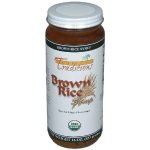 roller coaster ride of your blood-sugar levels while continuing to indulge your sweet tooth. This is an organic natural sweetener produced by steeping brown rice with a special enzyme preparation. Following this method the broken whole grains or brown rice are converted into a smooth-flavored and pleasantly sweet liquid extract. It has a mild almost buttery flavor and delicate sweetness, which makes it a nice choice for baking and desserts. The glycemic index is 25.
roller coaster ride of your blood-sugar levels while continuing to indulge your sweet tooth. This is an organic natural sweetener produced by steeping brown rice with a special enzyme preparation. Following this method the broken whole grains or brown rice are converted into a smooth-flavored and pleasantly sweet liquid extract. It has a mild almost buttery flavor and delicate sweetness, which makes it a nice choice for baking and desserts. The glycemic index is 25.

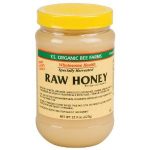
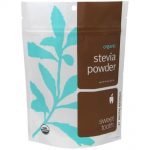



This is GREAT information. I search the Internet rather frequently for answers to this very question and you’d be amazed to see how few concrete tidbits are out there. I used to use raw honey, but have since switched to stevia because honey can be hard to mix into cold things like yogurt. The stevia I use now is white, but after reading this, I’m going to try to find it in the raw. Can you find this in grocery stores, or do you have to order it online?
Hi Emmy-
Navitas Naturals is the only company that I have been able to find that has a less processed stevia product. They do sell the brand at Whole Foods but am not sure if they carry the stevia. You can slightly melt the raw honey but you will destroy some of the enzymes. A food is considered raw up to 104% but I am not sure what the melting point of raw honey is.
Thanks for these tips! I have been using agave nectar and honey for a while but I love to bake! It is always good to read about alternatives that I can use instead of sugar. I am a bit of a sugar-a-holic, so it is going to take me a while to get clean and learn to reduce my cravings.
I really appreciate all the info on here for battling PCOS…there is just one myth I wanted to clarify, since Agave Nectar has gotten so much attention, but it’s benefits are deceitful.
Agave Nectar is actually not good at all (a total bummer). It is made from agave starch and processed the same way as corn syrup…and it has even HIGHER levels of fructose.
“…fructose inhibits leptin levels — the hormone your body uses to tell you that you’re full. In other words, fructose makes you want to eat more. Besides contributing to weight gain, it also makes you gain the most dangerous kind of fat.”
http://www.foodrenegade.com/agave-nectar-good-or-bad/
Thanks Lisa. I believe you are right about agave. I will modify my list.
Just want to clarify – honey is still okay, but just in small doses (i.e. if you’re putting 1 or 2 tablepoons of honey in your coffee in the morning, that’s considered okay for PCOS, correct?
Hi Rehma-
Yes a little bit of honey is okay. I would still try to cut back on the sugar in your coffee. I have weaned myself down to none or very little.
There is a company called Vivalac that has a product out called Whey Low. It tastes EXACTLY like sugar to me. It comes in granular, brown & powdered. Have you ever heard of it and if not would you mind taking a look at it and giving your opinion? Thanks so much!!
I had never heard of Vivalac and Googled it. It is made from dairy and I am not a big fan of dairy for PCOS – you can read more in my Don’t be a Dairy Queen. I would rather use sweeteners that are closer to nature – like honey and maple syrup.
Hi Amy,
What about xylitol ?
What about Truvia?
Hey there
Thanx for all the information on the site – I think you have saved my life! I have recently started using stevia when I make my ice-cream and I love it! But I was just wondering, I am always hearing bad rumours about agave especially because it is so high in fructose and low in glucose – what are your thoughts on that?
Thanx again!
-Anna
I do use it once in a while but I mainly rely on stevia, honey, coconut sugar and maple syrup for sweeteners.
I have read in many sites over the net that honey shouldn be heated or be put over substances. Like you said Amy that heat destroys some of its enzymes… So, with that logic… it shouldn be used w/ tea or coffee…
ny thoughts?
*put over hot substances…
Have you heard of “Just Like Sugar”? I picked up a flyer about it at our local health food store and tried a small bottle. Although I liked it best measured a little more than usual, it seems like a pretty good alternative to sugar and is full of fiber. Thoughts?
I hadn’t heard about it but just searched it is basically Maltodextrin a sugar obtained by hydrolysis of starch – a combination of maltol and dextrin.
Maltol is found in chicory. I’m not sure how I feel about it. I really like to stick natural sweeteners like little honey or maple syrup if I need a little sweetness.
What about Agave nectar?
Agave is highly processed and very high in fructose. This is not a good choice for women with PCOS.
Is Xylitol a good substitute? I really can’t stand the after taste of stevia.
Just make sure your xylitol is coming from a good source – some is made from GMO corn.
Hi! I am researching on coconut palm sugar and getting mixed reviews. Some say that the low GI number isn’t accurate, or that coconut palm sugar isn’t all that different from other sugars. After some more research, I have come to the understanding that while it may have a low GI due to the inulin (soluble dietary fibre), it still has a considerable amount of fructose. Fructose when taken in high amounts can cause increased insulin resistance and obesity. So my understanding is to use it occassionally, and in small amounts. Also, apparently those nutrients aren’t of much use to the body in small amounts ; do you agree with this?
Thanks for reminding me to update this post Arma. Yes the current understanding is that coconut sugar isn’t as “healthy” as we originally thought and does contain fructose. I tend to avoid most sweeteners these days and I find if I do need a sweetener my go to sweetener is maple syrup. I’m a believer in moderation. If you use a little coconut sugar to sweeten a baked good our sauce that you indulge in on limited occasions, you should be okay. It is about becoming very mindful and look to find sweetness in your life in non-food ways.